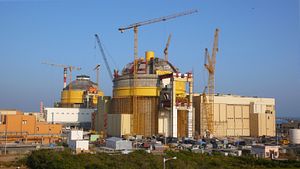Expectations are increasing ahead of Indian Prime Minister Narendra Modi’s bilateral visit with Japanese Prime Minister Shinzo Ape next week in Tokyo. While there are several prospective economic and security related deals on the table, India has stated it is particularly interested in signing a nuclear pact with Japan. Despite the red tape involved in any such deal, Japan will be just as eager to sign a nuclear deal with India, as its reactors remain offline and the prospects for nuclear reactor manufacturers remains dismal domestically.
Modi is certainly doing his part to drum up expectation and favor with the Japanese. In the lead up to the meeting, Modi has been tweeting messages in Japanese and English about his excitement at meeting Abe. Modi is one of only three people that the Japanese prime minister follows on Twitter, although it doesn’t appear that Abe has responded through that channel.
Reuters estimates India’s nuclear industry to be an $85 billion market, and a former member of India’s atomic energy commission (who is privy to the energy pact negotiations) told the news agency that “Serious efforts are being made to resolve any special concerns that Japan has. Whether it will be fully resolved and ready for signing before the end of the PM’s trip is unclear… [but] I would give it a little better-than-even chance at this point.” Japan’s concerns involve India’s nuclear weapons program, and it is looking for guarantees that India won’t carry out further nuclear tests, as well as more stringent nuclear facility inspections.
India represents a very large potential market for major Japanese corporations like Hitachi Ltd and Toshiba Corp, as the domestic nuclear power market in Japan is unlikely to ever recover to its former level of providing 30 percent of the country’s overall energy supply. India meanwhile is one of very few countries with which Japan shares warm political ties that is also looking to drastically expand its nuclear energy market. The Indian government has stated a goal of increasing the volume of energy generated from nuclear power from 4,780 MW currently (representing roughly 2 percent of total capacity) to 63,000 MW by 2032.
With such potential growth, it would be unsurprising to see Japan’s government and its major nuclear firms intent on quickly reaching a deal. However, Tokyo will still have to proceed cautiously, and not only because of India’s nuclear weapons program. In a country as vast as India that is still experiencing sporadic and uneven development, a large increase in nuclear power generation will have to be undertaken carefully. As Japan has shown, even the most stringent regulations in one of the world’s most hyper-developed countries do not preclude disaster. India will also have to demonstrate that it can take adequate measures to maintain the stability of new reactors throughout their long life cycle.

































